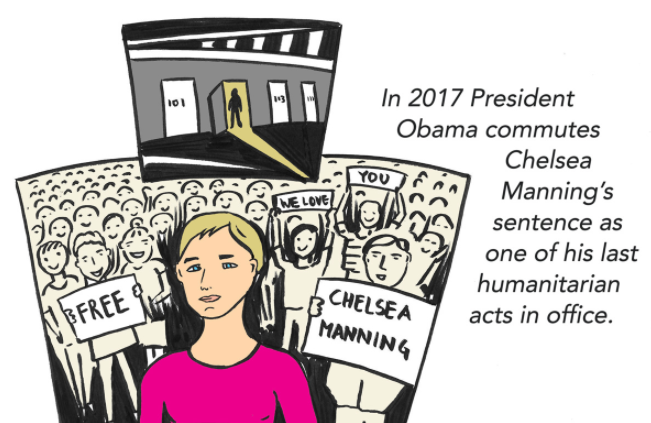Combattere per il futuro: una lista di letture in onore di Chelsea Manning
Oggi, 17 maggio 2017, Chelsea Manning esce dal carcere di Fort Leavenworth, dove ha trascorso gli ultimi sette anni. Nella prigione americana dove è reclusa ha combattuto sia per la libertà di informazione che per la sua salute e e i suoi diritti di persona transgender. Abbiamo scritto più volte delle lotte di Chelsea e abbiamo chiesto anche noi la grazia per lei, poi concessale dal presidente Obama.
Chelsea ha 29 anni. Per raccontare la sua storia e guardare al futuro pubblichiamo una traduzione di un articolo di Beatrice Martini dal titolo “Fighting forward: a reading list in honor of Chelsea Manning”.
“Continuo a lottare per mettere in guardia contro il pericolo che l’unica informazione a cui si ha accesso sia controllata da chi ha soldi o potere”
Why I keep fighting – Chelsea Manning
Chelsea Manning è una donna transgender, attivista per la trasparenza e celebrata whistleblower.
Nel 2013 è stata condannata a 35 anni di carcere per aver consegnato documenti militari e diplomatici a WikiLeaks. Il 17 gennaio 2017 la sua pena è stata commutata: verrà quindi rilasciata il 17 maggio 2017, invece che nel 2045.

Per celebrare questo evento e riflettere sull’enorme impatto che le sue azioni hanno avuto e hanno, questo post raccoglie una serie di articoli sul suo caso e sugli anni in carcere. Sono stati scritti da Chelsea stessa e da altre persone che, a loro volta, hanno dato voce alle sue parole quando il sistema cercava di soffocarle.
Forse non la ringrazieremo mai abbastanza per il suo lavoro. Ma possiamo fare in modo di imparare da lei e far sì che le sue parole viaggino e vengano ascoltate da molti.
Se volete aiutarla a ricominciare la sua vita dopo il carcere potete farlo qui, facendo una donazione a questa campagna organizzata da famiglia e amici. Le donazioni saranno usate per iniziare una nuova vita e per le spese mediche durante il suo primo anno da donna libera.
Scritti dal tribunale e dalla prigione
A inizio 2010 Chelsea Manning consegna informazioni secretate a WikiLeaks, venendo arrestata a maggio dello stesso anno.
Chelsea rende pubblica una enorme quantità di documenti, tra cui i “war logs” da Afghanistan e Iraq, più di 250mila documenti diplomatici da ambasciate americane di tutto il mondo e documenti ufficiali su 765 detenuti di Guantanamo. Uno dei più noti è un video che mostra un attacco aereo dell’esercito statunitense in un sobborgo di Baghdad. Il video, pubblicato da WikiLeaks col titolo “Collateral murder” crea uno scandalo internazionale sulle azioni militari degli Stati Uniti in Iraq e marca un passaggio fondamentale nella storia del whistleblowing, discusso ancora oggi.
Chelsea viene condannata a 35 anni nella prigione militare di massima sicurezza a Fort Leavenworth.
Non le è consentito di usare Internet e il suo accesso a libri e giornali è fortemente controllato. Può ricevere visite solo da persone che conosceva prima della condanna e comunque non da giornalisti. Nel 2014, però, le sue parole iniziano a essere pubblicate online, prima sul Guardian, con cui inizia a collaborare alcuni mesi dopo, e poi sul suo blog. Apre anche un account Twitter che aggiorna dettando i tweet per telefono.
Nonostante tutti i tentativi di limitare il suo accesso a canali di comunicazione, le sue parole sono state lo strumento più potente per raccontare la sua storia, condividere le sue idee e farci imparare da lei.
Questa lista comprende articoli, interviste e trascrizioni di Chelsea, i giornalisti che hanno scritto del suo caso, i suoi avvocati e gli amici che potevano farle visita. Le date aiutano a orientarsi tra processo, sentenza e altri eventi. [gli estratti inglese non sono stati tradotti, NdT]

United States v Pfc. Manning: Pfc. Manning’s Statement for the Providence Inquiry. 3 febbraio 2013
Le dichiarazioni di Chelsea Manning al tribunale durante una udienza preliminare. Include il primo racconto ufficiale di come ha scaricato centinaia di migliaia di documenti secretati e video dai database militari e li ha consegnati a WikiLeaks. Il 12 marzo 2013 un audio di queste dichiarazioni è stato pubblicato da Freedom of the Press Foundation.
Searchable database of the official record of trial (transcripts) and exhibits for the trial United States. v. Pfc. Manning – Alexa O’Brien.
“United States v. Pfc. Manning was conducted in de facto secrecy. The public was not granted contemporaneous access to court filings or rulings during her trial. In addition to reporting on her trial, I transcribed the proceedings, reconstructed the censored appellate list, and un-redacted any publicly available documentation, in order to foster public comprehension of her unprecedented trial.”
Dear Chelsea Manning: auguri di buon compleanno da Alan Moore, Birgitta Jónsdóttir, Edward Snowden, JM Coetzee, Joe Sacco, Lupe Fiasco, Michael Stipe, Molly Crabapple, Peter Tatchell, Billy Martin, Saul Williams, Slavoj Žižek, Terry Gilliam, Vivienne Westwood, Luke Harding. The Guardian. 16 dicembre 2014.

What happens to society in the absence of an alternative, counter-narrative to that of the national security state? – Alexa O’Brien, Center for Investigative Journalism, London. 4 agosto 2015.
Alexa O’Brien discute il metodo giornalistico usato e quello che ha imparato scrivendo di notizie censurate, in particolare riguardo al processo Manning.
Double data – Joanne McNeil. 14 gennaio 2015.
“Ultimately Manning’s whistleblowing revealed how power works. These are systems locked in place and in secret. That’s what the cables revealed. The empire is attenuated but secret. Secrecy is the fuel of its engine.”
Five years on, the WikiLeaks ‘Collateral Murder’ video matters more than ever – Christian Christensen, Common Dreams. 4 aprile 2015.
“If the content of the video illustrates the violent arrogance of power, then the leak of the video illustrates the potential power of dissent and courage.”
The years since I was jailed for releasing the ‘war diaries’ have been a rollercoaster – Chelsea Manning, The Guardian. 27 maggio 2015.
“In 2010, I was considerably less mature than I am now, and the potential consequences and outcomes of my actions seemed vague and very surreal to me. I certainly expected the worst possible outcome, but I lacked a strong sense of what “the worst” would entail. I did expect to be demonized and targeted, to have every moment of my life re-examined and analyzed for every possible personal flaw and blemish, and to have them used against me in the court of public opinion or against transgender people as a whole.”
Military haircuts. My first post about what it’s like to live, and grow as a human being: transitioning in a military prison – Chelsea Manning. 7 ottobre 2015.
“I hope to use this platform as a place to document my experience and share my story and, maybe even begin a conversation. Going through such a seismic, existential shift in my life – transitioning in a military prison – presents real, meaningful, and daily challenges.”
Six years so far. What I have learned being in prison these last six years – Chelsea Manning. 17 marzo 2016.
“Act as your own filter for information. Search for your own answers to questions. If we rely on others to digest information for us, than we can’t say that we truly understand why we have done what we’ve done and where we will be going. We cannot, and will not, understand the world looking at information filtered through one lens.”
Solitary confinement is ‘no touch’ torture, and it must be abolished – Chelsea Manning, The Guardian. 2 maggio 2016.
“[…] conditions similar to the ones I experienced in 2010-11 are hardly unusual for the estimated 80,000 to 100,000 inmates held in these conditions across the US every day.
In the time since my confinement at Quantico, public awareness of solitary confinement has improved by orders of magnitude. People all across the political spectrum – including some who have never been in solitary or known anyone who has – are now beginning to question whether this practice is a moral and ethical one. […]
The evidence is overwhelming that it should be deemed as such: solitary confinement in the US is arbitrary, abused and unnecessary in many situations. It is cruel, degrading and inhumane, and is effectively a “no touch” torture. We should end the practice quickly and completely.”
Why I keep fighting. Chelsea Manning’s acceptance speech for the 2016 Blueprint Enduring Impact Whistleblowing Prize. 9 maggio 2016.
“I keep fighting to survive and thrive. […] I keep fighting to warn the world of the dangerous trend in which the only information you can access is the kind that someone with money or power wants you to see.
And, I keep fighting to let people know that they too can create change. By staying informed and educated, anyone can make a difference. You have the ability to fight for a better world for everyone — even for the most desperate, those at the bottom of the social ladder, refugees from conflict, queer and trans individuals, prisoners, and those born into poverty.”
Far from over. My Court Martial Appeal is only the beginning – 20 maggio 2016.
“Wednesday, we filed a brief appealing the conviction and sentence of my court martial in 2013.
It has taken my legal team — Nancy Hollander and Vincent Ward, of Freedman, Boyd, Goldberg Urias and Ward P.A., and US Army Captain David Hammond — nearly three years of hard work pouring over the tens of thousands of pages of transcript and court filings to put this magnum opus together. I would like to thank everyone who donated and showed their support over these years, it would not be possible without you.”

xychelsea and xychelsea part 2 – Yan Zhu. 25 e 26 maggio 2016.
“[…] I looked at her as if I would never see her again, my heart sinking with the realization that there will probably never exist a photo of Chelsea Manning, age 28, for the world to see. It made me sad, because she looks nothing like any of the photos of her on the Internet. She looked like a hero, brighter and stronger than in all my memories, radiant with a light that makes no sense.”
“Chelsea is a former soldier, a celebrated whistleblower, a role model for millions of people around the world, a pioneer for transgender rights, and a hero who will be remembered forever in American history, but right now she is just a small figure in my arms, scared like the rest of us and wanting nothing more than to go home.”
The suppression of Chelsea Manning – Melissa Gira Grant, Pacific Standard. 7 giugno 2016.
“The panic around what Manning exposed — not what was contained in those files, but that there were so many — became twinned with the suspicions surrounding her identity. These were only magnified by how impossible it was at the time to know her.”
Seeing Chelsea – Chase Strangio. 24 agosto 2016.
Chase Strangio, avvocato presso ACLU, rappresenta Chelsea Manning in una causa contro il Pentagono, che le ha impedito l’accesso al trattamento sanitario previsto per la disforia di genere.
“One of the many things that Chelsea has lost through her incarceration is her ability to publicly shape the narrative of who she is. She writes beautifully and contributes to the public discourse on government accountability and transparency, trans rights, and justice for prisoners. But she is scrutinized and literally locked away and cut off from the world so her voice is always mediated through something or someone else. That doesn’t make her voice or her contributions less real but for a person as beautiful and thoughtful as Chelsea, these mediums don’t do her essence justice.”
Being Chelsea Manning – Melissa Gira Grant, Pacific Standard. 12 ottobre 2016.
“Throughout her court martial, Manning was rendered nearly invisible and silent. Now serving her sentence, and speaking through her own writing and to the press, she faces ongoing threats of additional punishment.”
Free Chelsea Manning now – Chase Madar, Jacobin. 13 gennaio 2017.
“Defending Manning and her leaks are not just a matter of goody-two-shoes principle but immense real-life consequences. The US invasion of Iraq was simply not possible but for government secrecy, distortion and lies. The architects of that dishonest war have escaped the slightest punishment, yet an on-the-ground private who tried to share her knowledge of that bloodbath is the one being severely punished.”
A case for Executive mercy for Chelsea Manning – Alexa O’Brien. 14 gennaio 2017.
“Manning was a humanist soldier trapped between the cynical realities of warfare, her youth, and her characteristic earnestness – clinging onto the exigent hope that sanity and common sense would triumph if buttressed by knowledge and deliberation. Whether or not such an ideal is real or a fairytale remains to be seen. An act of mercy by the Executive, might evidence its display in our own imperfect experiment in self government. Manning isn’t perfect; neither is the U.S. Government. Can we all learn from these events and move on now?”

Incredible news: President Obama has commuted the sentence of whistleblower Chelsea Manning – Rainey Reitman, Trevor Timm, Freedom of the Press Foundation. 17 gennaio 2017.
“[…] whistleblowers acting in the public interest should not be beholden to the president’s whims. Instead, fair laws should ensure strong protections for whistleblowers who shed light on human rights abuses, war crimes, corruption, and government deception.
[…] Until the Espionage Act is reformed and strong protections for whistleblowers are enacted, those who follow in Chelsea’s footsteps may face similar persecution.”
Looking back on 6 years of fighting for Chelsea Manning – Rainey Reitman. 18 gennaio 2017.
“It boggles the mind to think how far we came with the Chelsea Manning Support Network. In some ways, we were squaring off against the United States government itself, with its seemingly infinite resources. As the trial dragged on for years, we had to fundraise for every dollar to cover legal fees, buy supplies to send mailings, and pay a pittance to a small group of overworked, dedicated, wonderful organizers who used every scrap of bravery and creativity imaginable to advance the public’s knowledge of Chelsea Manning.”
Chelsea Manning did the right thing. Finally, Barack Obama has too – Trevor Timm, The Guardian. 18 gennaio 2017.
“Many publications have tried to list the many stories her revelations have contributed to over the years, but almost all have fallen short. The State and Defense documents that were leaked by Manning – originally to WikiLeaks and published by the Guardian, New York Times and others – are to this day cited regularly in the nation’s largest newspapers. They provided historians and the public a view inside the US government’s machinations that we’ve never seen before. They even helped end the Iraq war.
In response, the government quite literally tried to destroy her. Although the government admitted that no one was harmed because of her disclosures, Chelsea suffered beyond what is imaginable for most people.”
Chelsea Manning’s attorneys: Obama’s commutation will help save life of jailed Army whistleblower – Amy Goodman di Democracy Now intervista Nancy Hollander e Chase Strangio (ACLU), che rappresentano Chelsea nella causa contro il Pentagono. 18 gennaio 2017.
“The secretary of defense at the time, Gates, said that the worst that happened was some embarrassment for the United States. There was not a single individual ever identified who was harmed by what Chelsea did. What Chelsea did actually helped the United States. It helped Americans. It helped people around the world understand about human rights violations, understand—bring war home to people. She wanted people to see what happens to somebody who gets killed, what happens to people in Iraq and Afghanistan. She wanted to make this real, so that we would stop doing these kinds of things to people. And so, what they’re saying is exactly the opposite of what Chelsea did. There has never been a single bit of evidence that anybody was harmed or that national security was harmed.”
A lawyer for Chelsea Manning explains what’s next after her life-saving commutation – Tyler Trykowski intervista ACLU attorney Chase Strangio, Vice. 24 gennaio 2017.
“One of the general realities of incarceration is the way we dehumanize those we cage and lock away. We do that in a number of ways – by literally removing people from society, but in other administrative and emotional ways, too, by restricting people’s access to communication, to touch and intimacy – and that makes it much harder to perceive them as human beings. Which is, of course, the precise purpose of our punitive incarceration machine.
For Chelsea in particular, the government was very invested in taking away her voice and making her a symbol and an example to justify its incredibly cruel treatment of her. As advocates working with her, one challenge was finding ways to help her tell her story on her own terms, and be experienced as a human being by the public. Even listening to reactions from the media last week, nobody has any idea who she is, and, most frankly, have no idea what her case is about. […]
These are things about her that so few people realize or know – her motivations for service, her dedication to country, and the systemic discrimination she experienced as a low-income queer and trans person.
During these last three years, she has been able to write some and share her story, and we were able to help her with her Twitter account and things like that. But she hasn’t been seen, you know? In so many ways – not just visually.”
Se volete fare una donazione al Chelsea Manning Welcome Home Fund, potete farlo sulla pagina ufficiale.
Per saperne di più su Chelsea, potete leggere le sue parole su Twitter e Medium.
Beatrice Martini è Human Rights Technology Lead presso Aspiration.
Si occupa di creare strategie per l’utilizzo della tecnologia da parte di nonprofit, studiare l’impatto della tecnologia per i diritti umani in vari contesti ed esplorare nuovi modi per creare un linguaggio condiviso su questi temi. Nata in Italia, Beatrice vive da diversi anni a Berlino.





